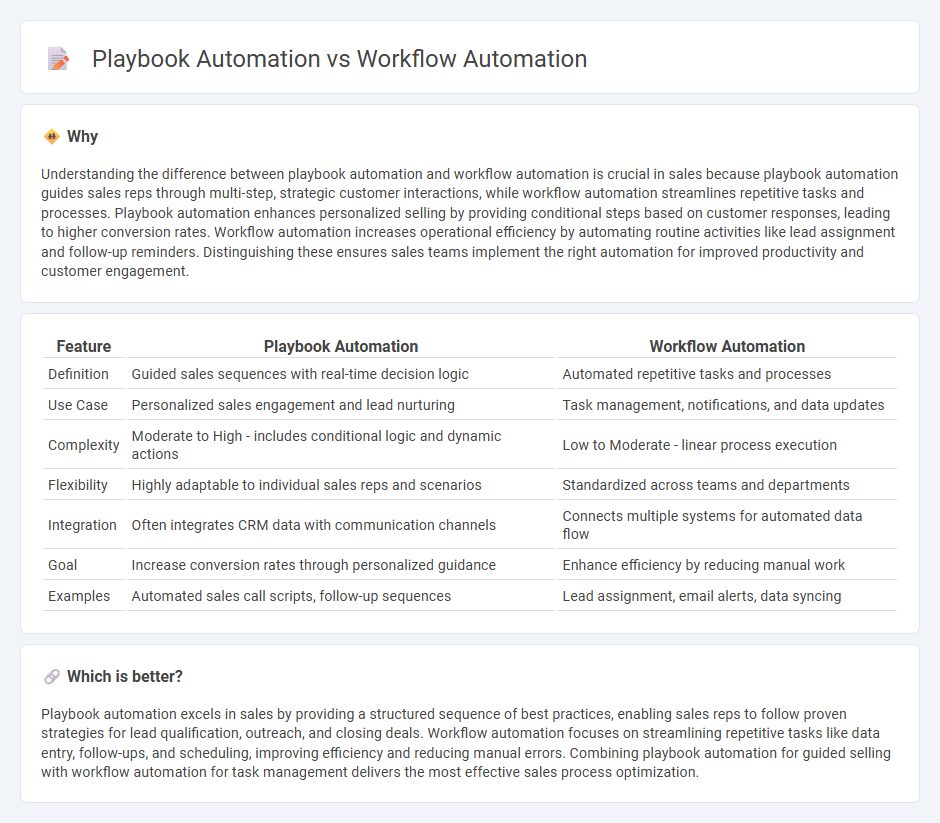
Sales playbook automation streamlines repetitive tasks by providing structured, step-by-step guidance to sales teams, enhancing consistency and efficiency in customer interactions. Workflow automation integrates various sales processes and data flows across platforms, ensuring seamless task coordination and real-time updates to boost overall sales productivity. Explore how combining playbook automation with workflow automation can transform your sales operations and drive revenue growth.
Why it is important
Understanding the difference between playbook automation and workflow automation is crucial in sales because playbook automation guides sales reps through multi-step, strategic customer interactions, while workflow automation streamlines repetitive tasks and processes. Playbook automation enhances personalized selling by providing conditional steps based on customer responses, leading to higher conversion rates. Workflow automation increases operational efficiency by automating routine activities like lead assignment and follow-up reminders. Distinguishing these ensures sales teams implement the right automation for improved productivity and customer engagement.
Comparison Table
| Feature | Playbook Automation | Workflow Automation |
|---|---|---|
| Definition | Guided sales sequences with real-time decision logic | Automated repetitive tasks and processes |
| Use Case | Personalized sales engagement and lead nurturing | Task management, notifications, and data updates |
| Complexity | Moderate to High - includes conditional logic and dynamic actions | Low to Moderate - linear process execution |
| Flexibility | Highly adaptable to individual sales reps and scenarios | Standardized across teams and departments |
| Integration | Often integrates CRM data with communication channels | Connects multiple systems for automated data flow |
| Goal | Increase conversion rates through personalized guidance | Enhance efficiency by reducing manual work |
| Examples | Automated sales call scripts, follow-up sequences | Lead assignment, email alerts, data syncing |
Which is better?
Playbook automation excels in sales by providing a structured sequence of best practices, enabling sales reps to follow proven strategies for lead qualification, outreach, and closing deals. Workflow automation focuses on streamlining repetitive tasks like data entry, follow-ups, and scheduling, improving efficiency and reducing manual errors. Combining playbook automation for guided selling with workflow automation for task management delivers the most effective sales process optimization.
Connection
Playbook automation integrates predefined sales strategies into automated workflows that streamline repetitive tasks such as lead qualification, follow-ups, and deal progression. Workflow automation ensures consistent execution of these sales playbooks by triggering actions based on CRM data and sales activities, enhancing efficiency and accuracy. This connection accelerates sales cycles and improves team performance by providing actionable, real-time guidance aligned with proven sales processes.
Key Terms
**Workflow Automation:**
Workflow automation streamlines repetitive business processes by using software tools to automate tasks like data entry, approvals, and notifications, increasing efficiency and reducing human error. It integrates multiple tasks across different systems to create a seamless flow of information and actions without manual intervention. Discover how workflow automation can transform your operational productivity and reduce costs.
Process Mapping
Workflow automation streamlines repetitive tasks by defining sequential steps and automating their execution, while playbook automation integrates dynamic decision-making paths tailored to specific incident responses or complex scenarios. Process mapping underpins both by visually representing each activity and decision point, enabling precise identification of automation opportunities and ensuring alignment with business goals. Discover how effective process mapping enhances the synergy between workflow and playbook automation to optimize operational efficiency.
Trigger-based Actions
Workflow automation streamlines repetitive processes by automatically initiating tasks based on predefined conditions, improving operational efficiency across various systems. Playbook automation centers on trigger-based actions tailored for incident response and security operations, enabling dynamic, context-specific responses to threats. Explore the nuances of trigger-based automation to better align your technology strategy with business goals.
Source and External Links
What is Workflow Automation? [+ Benefits & How to Start] - Atlassian - Workflow automation uses task management software to route tasks and information between people and systems based on predefined rules and triggers, saving time and minimizing errors by automating task progression and updating dashboards.
What is Workflow Automation and Why is it Important? - TechTarget - Workflow automation enables tasks, documents, and information to flow independently across work activities, improving efficiency by automating repetitive manual tasks with either static or dynamic workflow structures.
What is workflow automation? - ServiceNow - Workflow automation uses software to autonomously manage the flow of tasks and data according to business rules, streamlining processes such as onboarding, approvals, and help-desk tickets to reduce manual work and enhance operational efficiency.
 dowidth.com
dowidth.com